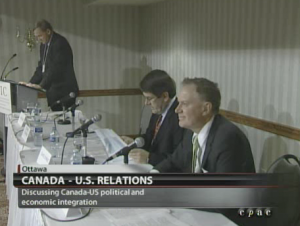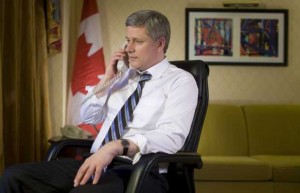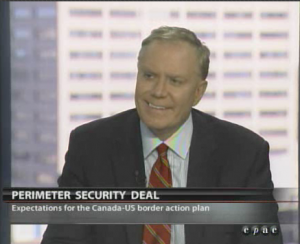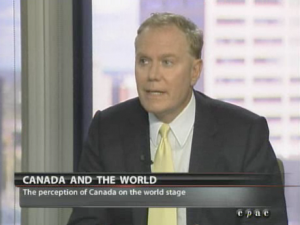- Former Canadian diplomat Colin Robertson talks with Power Play’s Don Martin and says he believes it’s very important for the Prime Minister Stephen Harper and U.S. President Barack Obama to conclude the first phase of talks concerning perimeter security between the two countries.
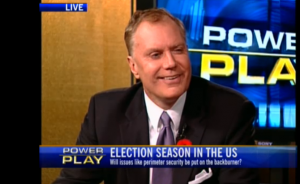
Could time be running out on the Canada-U.S. perimeter deal
Excerpted from Lawrence Martin ‘Could time be running out on the Canada-U.S. perimeter deal’ an ipolitics insight, October 20, 2011
A while back the Canada-U.S. perimeter accord looked like a done deal. Officials leaked word that President Barack Obama would come to Ottawa to sign a framework agreement on the border plan, one which would ease passage for goods, services and people.
But now there are doubts. Officials are holding out the possibility that owing to U.S. election year politics and other snags like the Buy-American issue, the deal could fall by the wayside.
The U.S. election primaries begin in January. “Election year. That`s the danger in this — that it gets spiked simply because time runs out,” said Canada-U.S. specialist Colin Robertson who is in touch with negotiators. “Once you get into the primaries then it`s really hard to get anybody`s attention.”
Robertson expressed optimism that the deal will make it. “I still think there is the time, if there`s the will.” Another official said the chances were about 50-50.
Protectionist measures like the Buy-American provisions in the president`s economic stimulus package aren`t making the finalizing of a border accord any easier. Yesterday top representatives of the respective governments were in open disagreement over the measures.
In a speech in Ottawa, U.S. ambassador David Jacobson said that the Buy-American provisions would not heavily impact Canada. But he was quickly rebutted by Trade Minister Ed Fast. Citing a previous Washington attempt at introducing Buy American regulations, Fast bluntly responded that “trade-restrictive measures between our two countries were recognized as wrong then. And they remain wrong now.”
A show of public discord of this kind isn`t normally the type of diplomacy that heralds the signing of a major bilateral agreement.
Officials now say it is highly unlikely that President Obama will come to Ottawa for a signing. They are hoping that the president will have Stephen Harper to the Oval Office for the ceremony.
A framework perimeter accord between the two sides has essentially been agreed upon. There are only some details to be worked out. If the two leaders sign it, then a round of consultations with provinces, states and other stakeholders need take place before the final accord is set. That could take months as some of the measures in the pact have to be approved by Congress. The election, which could see the Obama administration defeated, takes place next November.
Canadian provinces have signaled they are on board with the agreement as has the business community which also wants improvements on border access. But the framework agreement could contain security provisions on sharing of personal information between the two countries that could prompt opposition based on sovereignty concerns.
Initially the U.S. side wanted the deal to be worked out and signed by Homeland Security Secretary Janet Napolitano and her Ottawa counterpart, the public safety minister. But Ottawa rejected that plan, saying it would have too much the look of a security pact. Robertson said that for the deal to get approval in the U.S. it has to have the imprimatur of the president and the prime minister.
On election year timing, he recalled that a Canada-U.S. partnership accord fell by the wayside in 1999 owing to the 2000 campaign. On the other hand he said that the free trade agreement got approved in 1988, the year that Ronald Reagan ended his presidency.
A problem now, Robertson noted, is that Obama has an even bigger load of crises on his desk than in normal times. In such an atmosphere it’s hard for a Canadian concern – it’s Harper who initially pushed for the border accord – to make it to the top of the pile.
For Canadian leaders, it’s a problem with a long history. One day back in the 1950s, Lester Pearson, then external affairs minister, visited Dwight Eisenhower, the golfing president, at the White House. Pearson raised what he considered a pressing bilateral issue. Ike clearly didn’t know what he was talking about. On the way out an irked Pearson muttered to an aide, “you’d think his caddie would have mentioned it to him.”
Canada-U.S. Trade: Inside Ottawa’s Efforts To Fight ‘Buy American’
Excerpted from Rachel Mendleson ‘Canada-US Trade’ in Huffington Post October 20, 2011
As Washington continues to defend the contentious Buy American provisions outlined in the U.S. jobs bill, it has become abundantly clear that, for policymakers south of the border, Canada is not top of mind.
But according to a former Canadian diplomat who has been on the inside of major trade policy negotiations with the U.S., this reality, however harsh, simply reinforces a stubborn fact of life: No matter how friendly relations with our biggest trading partner may seem, Canadians must wage a permanent campaign to protect our interests south of the border.
“For the U.S., we’re not a problem, and therefore we’re not on the immediate agenda,” Colin Robertson told The Huffington Post. “We Canadians have to constantly be making the case to our American market, reminding them … that we’re also their biggest market.”
It’s an effort that Robertson — who helped negotiate and implement the North American Free Trade Agreement (NAFTA) — says is comprehensive, despite the fact that it may not always seem that way.
“Are we talking to all the various parties? We are, but stuff happens, and will continue to happen,” he says. “It’s like Whac-A-Mole. You’ve got to constantly be on guard, because [these kinds of protectionist provisions] are popping up in all kinds of places.”
Officials at the Canadian Embassy in Washington did not respond to questions from HuffPost pertaining to specific lobbying efforts, or how Ottawa first learned that Buy American was part of Obama’s jobs bill.
But according to Robertson, who was the embassy’s first Head of the Advocacy Secretary in the mid-2000s, Ottawa launched an active congressional relations program in Washington after the defeat of the East Coast Fisheries Agreement in 1979 — a decision he says “changed how we did business.”
The sheer volume of the legislation that is introduced in Congress is a perennial challenge for those seeking to detect and fight problematic clauses and provisions. So, in the mid-1990s, Robertson says the embassy subscribed to a professional tracking system that scans bills for key terms like “Canada” and “Buy American.”
“That’s how often we’ll discover this stuff,” he says…
For his part, Robertson, who is involved in current lobbying efforts through his work as a senior strategic advisor for the law firm McKenna, Long and Aldridge, says the chances that Canada will feel the brunt of these provisions are slim.
“It is doubtful the clause will survive as drafted by the president in his proposed jobs package that may or may not see light of day,” he says. “If it does, we may be exempted because of U.S. NAFTA and procurement obligations.”
But the spectre of continued protectionism south of the border is prompting some to advocate for a more long-term solution…
Deepening Canada-U.S. Integration
On October 19th, 2011, the National Capital Branch of the Canadian International Council held a foreign policy panel discussion on Canada’s relationship with the United States. Political scientist and author Stephen Clarkson, former foreign policy advisor David Dyment, and former Canadian diplomat Colin Robertson discussed Canada-US political and economic integration. Panelists focused the discussion on security as well as President Obama’s Infrastructure Initiative and its Buy America provisions. CPAC Broadcast
Harper Charts a Course for Canada
While he has many foreign policy critics, the prime minister has found his point on Canada’s diplomatic compass From the Ottawa Citizen, Monday, October 17,2011 and in the Hill Times, October 24, 2011
Argue with the taxonomy, but there are essentially three schools in Canadian foreign policy. The first is that designed by Sir John A Macdonald and Sir Wilfrid Laurier: the realist, power-and-interest school that actively participates in an alliance of the like-minded, initially led by Britain and now the United States. The external counterpart to Macdonald’s National Policy, it was followed through to Brian Mulroney, with adjustments for changing circumstances. Mulroney, moreover, was able to do in 1988 what Laurier failed to do in 1911 – exchange tariff protection for free trade.
The second is that of Mackenzie King: nationalist, regional in outlook, and both cautious and skeptical about international entanglements that aren’t reciprocal. This approach also appealed to populist, regional third parties from the Progressives through the Bloc Québécois.
Louis St. Laurent and Mike Pearson personified the third school, further refined by Pierre Trudeau and Jean Chrétien. Like the first school, it is committed to collective security. Assertively multilateral, it embraces international law and institutions, especially the UN. Energetically nationalist, it is ready to tweak the beak of the American eagle to underline Canadian independence.
Pundits and respected former practitioners have criticized Stephen Harper’s foreign policy as polarizing, lacking in strategic coherence and having put us out of the international game. To determine where to situate Stephen Harper’s “enlightened sovereignty,” let’s look at some of its main compass points.
Harper has taken Mulroney’s advice – which he reiterated in a speech at the University of Toronto on Thursday – on handling the United States, our most important relationship, especially his dictum “that we can disagree without being disagreeable” and that we always achieve more when we start with what is on their agenda. Harper also understands Mulroney’s corollary that Canadian influence in the world is measured to a significant degree by the extent to which we are perceived as having real influence in Washington. Harper is betting that the Obama administration can deliver on his initiatives to secure better access by pushing the perimeter beyond our borders and through regulatory reform.
Harper speaks by phone to Obama
Like its predecessors, the Harper government is also actively pursuing opportunities with other partners. Since 2006 it has concluded free-trade agreements with nine countries, including Honduras, Colombia, Peru and Panama and opened the door to closer partnership with Brazil. We are a nation of the Americas and they deserve more attention, beginning with Mexico, our mostly ignored, other NAFTA partner.
Negotiations on expanded trade are underway with close to 50 others, importantly with the European Union, Korea and India. All are incrementally important, especially with the Doha Round of international trade talks on life support. Priority should be placed on gaining a seat within the Trans Pacific Partnership, with its entrée into Asia Pacific.
China was initially, unnecessarily, cold-shouldered. Harper now appreciates that the approach of Trudeau, Mulroney and Chrétien – constant engagement with respect for “face.” With the relationship back on track, a second Harper trip in November should emphasize our people-to-people connections through schooling and migration, as well as our commercial objectives.
Fifty years and a trillion dollars later there is an acknowledgment that the “handout” approach to development isn’t working, especially in the case of Africa. A lead role for business in providing a “hand-up” as a job-generator makes more sense. In arguing for greater “aid effectiveness” Stephen Harper echoes a theme that dates back to Mike Pearson. As co-chair of the UN Commission following up on his G8 Muskoka Initiative on Maternal and Child Health, Harper’s first report provides a new framework for accountability and transparency.
Since the creation of the Jewish homeland, we have consistently, and correctly, stood in Israel’s corner. The Harper government, with support from the Liberals, has sharpened our stand by walking out or boycotting forums that link Zionism and racism.
Wearing the blue beret has considerable romantic appeal but Canadians haven’t led in peacekeeping for a couple of decades. Contemporary circumstances make it unlikely we’ll do so again soon. What is required is a capacity for peacemaking and disaster response. Our experience in Afghanistan has given us the “best little army” in the world with skills that proved adaptable and effective in the relief of Haiti.
The bigger policy question for Canadians, underlined in the Libyan intervention – “responsibility to protect” in all but name – is how far, and how much, should we commit to duties beyond our border that actively involve us in other people’s conflicts with significant risk to the lives of Canadians. As we have learned in Afghanistan and Iraq and are witnessing in the fallout from the Arab Spring, liberal democracy is not an easy transplant.
Few prime ministers have devoted as much attention to northern policy as Harper. A majority of Canadians see Arctic sovereignty as the country’s top foreign-policy priority. He needs to move ahead with the promised icebreakers, actively lead in the Arctic Council stewardship negotiations and remember that we need new frigates to patrol what is now the longest coastline in the world.
The comical Fossil of the Year award notwithstanding, the Harper approach on climate change reflects both Canadian ambivalence on energy and the environment and the complexity of regionalism. When given a choice in the 2008 election, Canadians rejected the Stéphane Dion “green-shift.” Nor has the Green party enjoyed anywhere near the success of its European counterparts. Taxing carbon may be good public policy but, like ending sales of asbestos, abandoning supply marketing, and permitting foreign investment in our resources, governments weigh these decisions against their calculus of national unity.
What is remarkable about Canadian immigration is the continuing public support and our commitment to pluralism, in contrast to the U.S. and European nations. Fixing our lax refugee standards was overdue and necessary to maintain public confidence. We admit a quarter million new settlers a year and, fragile economy notwithstanding, attracting and selection of talent is going to be increasingly critical. Putting the emphasis on the responsibilities of citizenship rather than “rights,” with respect for our history and traditions is both good policy and good politics.
From the outset, Harper put priority on steering our economy through troubled times. Reaping the dividends of the effort to “get government right” that began in the Chrétien years, we’ve brought northern light on private banking, fiscal and monetary management to the global table. It’s a tribute to this ongoing work that Bank of Canada Governor Mark Carney is a serious contender to head the Financial Stability Board, the newest pillar in global economic architecture.
Stephen Harper’s “enlightened sovereignty” fits comfortably within the Macdonald-Laurier tradition, albeit with a sharper and more conservative tone. It views the world as inherently dangerous and prepares accordingly. It is less UN-centric and less ambitious than some would like. It doesn’t always appreciate nuance. It will be more effective when it refurbishes a Foreign Service in which it lacks confidence. But is hardly polarizing. It leans without ambiguity to our traditional values and long-standing allies, beginning with the United States. It is more prudent than progressive. It is more incremental than strategic.
Coherence is fine for classroom discussion but the international chessboard obliges adaptability. Our priority must always be on what serves the national interest. We may not have a seat on the UN Security Council but we play where it counts. Our contribution is acknowledged by those who matter. Five years on, we are still very much in the game.
John Baird as Foreign Minister
- A former Canadian diplomat, Colin Robertson, and the president of the Ottawa Diplomatic Association, Zambian High Commissioner Nevers Mumba discuss John Baird’s performance as the foreign affairs minister after Powerplay host Don Martin interviews Foreign Minister John Baird on October 14
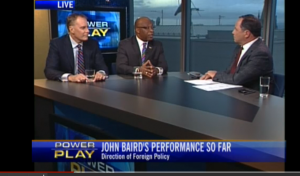
Copyright and Intellectual Property protection
excerpted from Embassy October 6, 2011 United States, European Union fingered in new copyright push By Sneh Duggal
Whenever the Harper government has sought to change the rules surrounding copyright in Canada, it has been accused of bending to the will of foreign governments. And as it seeks to change them again, some are pointing fingers at the United States and the European Union as the source of pressure.
The Conservatives reintroduced its Copyright Modernization Act, now Bill C-11, on Sept. 29. This is the third time the Conservatives have brought such a bill to Parliament in the past few years—but this time, the party has the numbers to pass the bill, and says it hopes to wrap up the whole affair by Christmas.
Those who have followed this copyright saga for years, such as University of Ottawa law professor Michael Geist, are convinced that “relentless US pressure” is to blame. But while he and others argue that parts of the bill may have resulted from foreign pressure, others have applauded the legislation, saying that it serves to bolster Canadian interests abroad.
Pushing Canada on intellectual property has long been a prominent foreign policy principle of the United States, said former Canadian diplomat Colin Robertson, now vice-president of the Canadian Defence and Foreign Affairs Institute. “The Americans have expected this for two-and-a-half years. The western world is moving to give greater protection to those who create,” Mr. Robertson said. There is a lot of Canadian talent that want the same protection the Americans and Europeans get, he argued… He also said the bill would likely pave the way for the introduction of other intellectual property legislation, especially relating to pharmaceuticals. “To bring a drug to market costs a billion dollars these days, sometimes more, [other countries] want to ensure that they have got adequate protection to ensure that the creator of the drug will make their money back,” he said….
Perimeter Security, Immigration and Beyond the Borders
CPAC’s Prime Time host Peter van Dusen interviews Former Canadian diplomat Colin Robertson, a vice-president with the Canadian Defence and Foreign Affairs Institute, and Edward Alden, a senior fellow with the Council on Foreign Relations, discuss the Canada-U.S. perimeter security negotiations, immigration and refugee policy, the challenges to a deal, and the possibility of an imminent announcement.
Stephen Harper’s World View
Excerpted from October Policy Options ‘Harper’s World View’
…Argue with the taxonomy, but there are essentially three traditions in Canadian foreign policy. The first is the realist, power-and-interest tradition that holds close to the hegemon, initially Britain and then the United States. The external counterpart to Sir John A. Macdonald’s National Policy, it has been followed, in varying degrees, by Macdonald, then Sir Wilfrid Laurier through to Brian Mulroney. The second is the Mackenzie King tradition, nationalist, regional in outlook, and both cautious and skeptical about international entanglements. It also appealed to populist, regional third parties from the Progressives through the Bloc Quebecois. The third is the St- Laurent-Pearson tradition, further refined by Pierre Trudeau and Jean Chretien: strongly nationalist and internationalist – assertive, energetic, with an emphasis on international law and institutions.
Looking at Harper’s record suggests his approach to foreign policy fits comfortably within the realist, power-and-interest tradition. At the outset the new PM promised to “build the relationships and the capabilities which will allow us to preserve our sovereignty, to protect our interests, and to project our values…In a shrinking, changing, dangerous world,” he declared in his first major foreign policy speech in October 2006. He continued: “our government must play a role in the world. And I believe that Canadians want a significant role – a clear, confident and influential role…they don’t want a Canada that just goes along; they want a Canada that leads. They want a Canada that doesn’t just criticize, but one that can contribute. They want a Canada that reflects their values and interests, and that punches above its weight.”
… The debate within Canada around energy and the environment is symptomatic of another rule of politics. What may constitute good public policy – taxing carbon, ending sales of asbestos, abandoning supply marketing, permitting foreign investment in our resources, is not always good politics. Regional differences make national consensus difficult. National unity comes with a price and there is more than a little wisdom to F.R.Scott’s lampoon of Mackenzie King: “Do nothing by halves/ Which can be done by quarters.”
While putting on the blue beret has considerable romantic appeal, Canadians have not led in peacekeeping for a couple of decades and contemporary circumstances make it unlikely we’ll do so again soon. In part, there has been an effort to ‘regionalize’ peacekeeping pools and in part, as Denis Stairs points out, contributing to UN peacekeeping operations is “a source of badly needed foreign exchange” for the main source countries – Bengladesh, Pakistan, India and Nigeria.
Technology and more failing states means what is required is less peacekeeping than peacemaking or peace enforcement or acting as a first responder to disasters. To echo historian Jack Granatstein, we owe former Chief of Defence Staff Rick Hillier a great debt for “changing the conceit that Canadians were peacekeepers first, last and always.” Our experience in Afghanistan has given us the ‘best little army’ in the world and the skills we’ve developed proved adaptable and effective in the relief of Haiti after the hurricane. This is a much more realistic role for Canada and while Canadians wanted us out of a combat role in Afghanistan, there is strong public support for the Forces.
Rather than flog the dead horse of peacekeeping, the bigger policy question for Canadians is how far, and how much, should we commit to duties beyond our border that actively involve us in other people’s conflicts with significant risk to the lives of Canadians. Observes Australian diplomat-scholar Owen Harries: “The successful promotion of democracy calls for restraint and patience, a sense of limits and an appreciation of the wisdom of indirection, a profound understanding of the particularity of circumstances.”
As we have learned in Afghanistan and Iraq, liberal democracy is not an easy transplant and any policy of imposing it through force will also fail. Acting with the best of intentions is inherently difficult to translate into significant change because of the extent to which they depend on other people and other, often intractable, societies.
The 2008 Canada First Defense Strategy gives teeth to our ambitions in homeland defence and in making a necessary contribution to collective security.: “`A handful of soldiers is better than a mouthful of arguments,”’ said Harper in Trapani, Italy the base for RCAF CF-18s flying over Libya, “For the Gadhafis of this world pay no attention to the force of argument. The only thing they get is the argument of force.”
Restoring the traditional designations – Royal Canadian Navy, Canadian Army and Royal Canadian Air Force – to strengthen their identities as national institutions is a positive step.
But the real test for the Conservatives will be to meet the new recruitment targets, ultimately 100,000 personnel (70,000 Regular Force and 30,000 Primary Reserve), and to meet the procurement timetable for the new ships and planes that will “give us the ability to act.” Our procurement process is inadequate. As the Auditor General and the Canadian Association of Defence and Securities Industries (CADSI) and others have pointed out, the likely result is that new kit will be delayed, abandoned or diminished in quality and quantity. We need to quickly develop a defence industrial strategy and a viable ship building industry. A useful first step would be to look to the experiences of our British and Australian allies…
Libya, the UN and PM Harper’s Initiative on Maternal Health
Former diplomat Colin Robertson analyzes Prime Minister Stephen Harper’s visit to New York to speak on Libya and maternal health with CPAC’s Prime Time Peter Van Dusen

